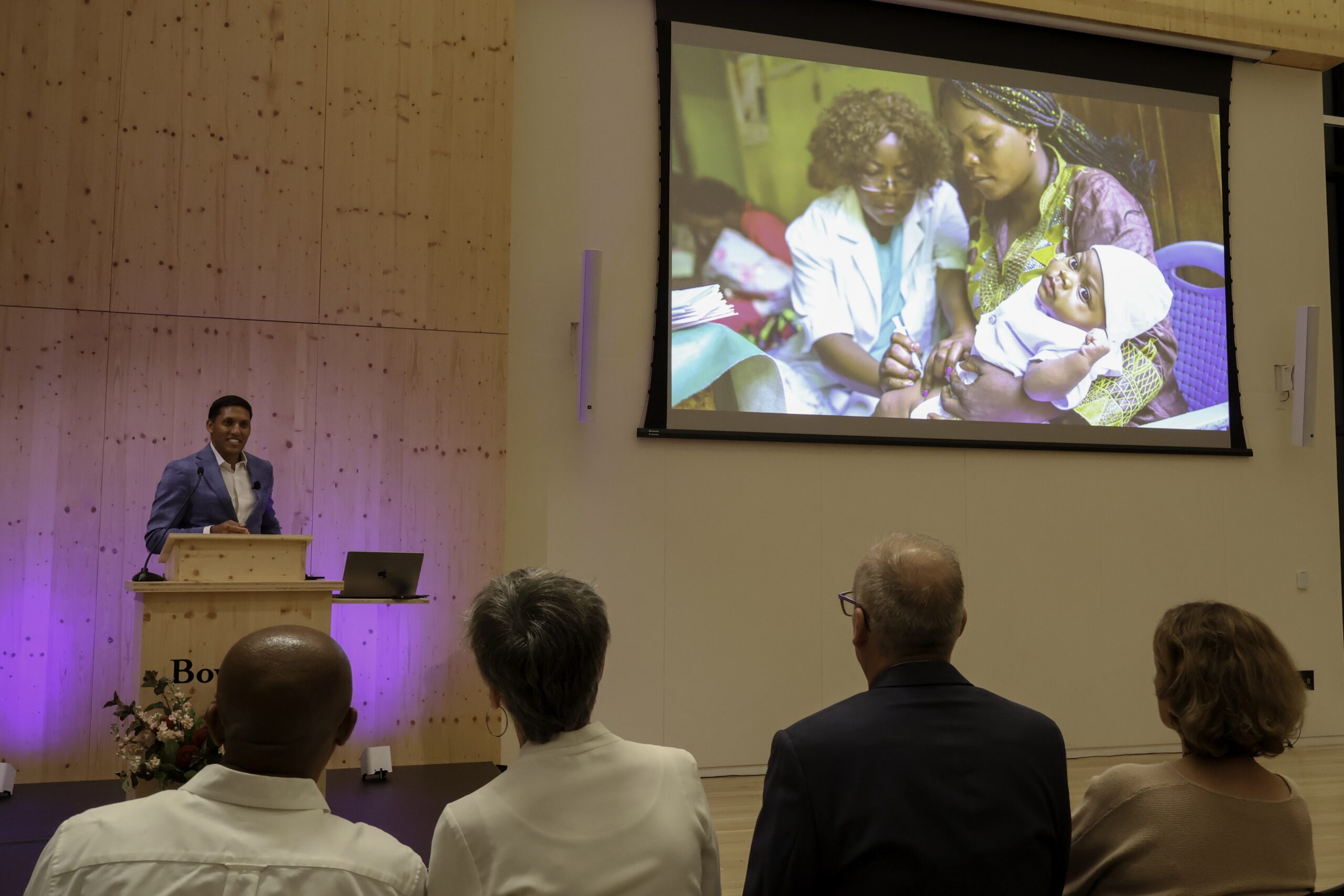Shah speaks on public health in Kates Lecture
September 12, 2025
 Abigail Hebert
Abigail HebertLast night, Dr. Rajiv Shah, president of the Rockefeller Foundation, spoke at the Arnold D. Kates Lecture on the future of global public health from the perspectives of lessons he has learned throughout his extensive career in public service, foreign aid and philanthropy.
The first of his lessons came from his experience working with the Bill and Melinda Gates Foundation, where he developed the International Finance Facility for Immunisation, a project that transformed the global vaccine market and saved millions of lives in the process.
At the time, the foundation sought to answer what it would take to vaccinate every child. As medical and public health experts questioned the feasibility of this endeavor, Shah offered an approach to make this goal a reality—one that reshaped the world’s financing approach to vaccines.
“It took the issuance of the world’s first large-scale social impact bond…. It required working in public, private partnership with vaccine manufacturers around the planet to build the capacity to manufacture enough volume of vaccines that they can be available at a low cost to countries. And it required investing in 77 different countries,” Shah said.
From this experience, Shah was able to rethink the way organizations tackle seemingly impossible questions within the field of public health.
“What I took away from this experience was that if you’re determined to make change happen at a massive scale, and if you never let go of the scale of that goal, in this case … you can actually start to solve problems in a way that’s fundamentally different than if you live within the existing constraints,” Shah said.
His next lesson came from his time as the administrator of the United States Agency for International Development (USAID). At USAID, Shah led the implementation of new technology and the development of new partnerships with the private sector to broaden the organization’s impacts, most notably through the creation of mobile networks for real time data collection during the Ebola pandemic.
During the Ebola pandemic, for the first time in the history of the United States, President Barack Obama deployed American service personnel to combat the disease, building health infrastructure and promoting global partnerships to slow the rate of transmission.
“We helped hire, train and, importantly, provide protective equipment to nearly 11,000 individuals from across the region, almost all local, community-based individuals that were part of the response,” Shah said.
However, it wasn’t until Shah worked with community leaders that USAID realized that the primary source of transmission was through cultural practices that aimed to provide dignified burials. Through the resulting USAID program, communities were able to perform these burials without compromising public health.
“The lessons to me, personally, from the Ebola response were truly around the need to keep experimenting and to recognize that solutions come from everywhere,” Shah said. “The best ideas often come from local communities who are most closely connected to the cultural practices and the reality in which they live, not the smartest experts in Atlanta, Washington or New York.”
Turning to his current role as the president of the Rockefeller Foundation, Shah shared another lesson he learned, this time from his work during the Covid-19 pandemic. When America failed to create a strong infrastructure for reliable Covid testing, the Rockefeller Foundation stepped in to address this pressing need.
“As an institution, we had to pivot very quickly to focus on Covid with some intensity,” Shah said. “We had to take a lot of risk very quickly by using our endowment to backstop purchase orders for tests before we knew where the actual funding would come from.”
Shah then transitioned into discussing the current critical moment in public health, as the United States, along with several European nations, has halted its developmental assistance to foreign countries. He shared that with the cuts in U.S. aid alone, 14 million people will lose their lives in the next five years with four and a half million of those being children.
“The challenge to us now as a global community is, can we rise up and prevent that loss of life when we reimagine the path to progress that gets us something like what we were experiencing in the 1990 to 2015 era?” Shah said.
Looking to the future, Shah is partnering with artificial intelligence (AI)-based companies to create digital tools that strengthen the impact of community health workers throughout Africa, Latin America and Asia. He also hopes this effort will drastically improve preparedness when the next pandemic inevitably hits.
“Another defining reality of global health, and why I remain very optimistic, is that it is now possible to dramatically upscale the level of the workforce in global health around the planet [through AI],” Shah said.
Andrea Becker ’26, who is currently taking a class on international development, expressed feelings of helplessness within the current political landscape but also felt inspired by the challenges Shah overcame in his career. She hopes to take on global issues in her own future.
“One of my big takeaways from the talk was this sense of inspiration.” Becker said. “[E]ven though I don’t necessarily have explicit answers on how to solve these massive crises, examples of past case studies and past stories—how they’ve addressed public health issues on a wide scale, from Covid-19 to Ebola—[are] so interesting.”

Comments
Before submitting a comment, please review our comment policy. Some key points from the policy: